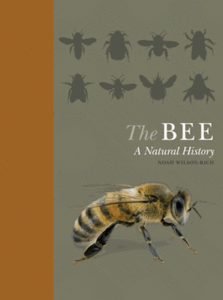The past few years have seen quite an increase in the amount of attention given to the state of honeybee populations around the world – and with good reason, for without their work in pollinating a sizable portion of the world’s food plants (as well as a host of other ones as well) much of life as we presently live it would change dramatically. But the European Honeybee (Apis melifera) is by no mean the only species of bee in the world, nor is it the only species contributing to the ongoing pollination cycle of the worlds flowering plants. There are, in fact, more than twenty thousand species of bees inhabiting the world, in astonishingly diverse forms and playing a remarkable number of different and very vital roles in the biomes of all the world’s continents save Antarctica.
Yet for all the attention given to the state of the world’s bees – both honeybees and others – very few books have been published in recent years that set out to provide an overview of the natural history of the wide range of these fascinating creatures to the general reader. Which is why Dr. Noah Wilson-Rich’s The Bee; A Natural History is such a timely book, for in its pages both the experienced naturalist as well as the interested newcomer can discover a wealth of information about the evolution, biology, and present state of the world’s bees.
Of all the people who might have written such a book, few can claim to posses the unusual combination of credentials as the charismatic Dr. Wilson-Rich. Not long after graduating with a degree in biology from Northeastern University, and prior to completing his doctorate in the same subject from Tufts, he founded The Best Bees Company to help establish bee hives in urban locations that were being depleted of honeybees and to help others learn how to take up the practice of apiculture. In 2012 he delivered the very popular TED Talk “Every City Needs Healthy Honeybees” that clearly explained the vital importance of these creatures not just to the countryside but to urban areas as well.
But as noted, Dr. Wilson-Rich presents a much wider picture of bees in his book. From Sweat Bees to Orchid Bees to Mining Bees and far beyond, The Bee; A Natural History presents the reader with an overview of the entire taxonomic clade Anthophila. Beginning with the evolution of the bee from apoid wasps some one hundred million years ago, through an overview of their biology (which, it must be noted, might be a bit complex for the newcomer in places), and into explanations of bee sociology and behavior, he first three chapters of The Bee; A Natural History provide a thorough general overview of family that will well serve the needs of most any naturalist.
However as humans (to say nothing of the host of other creatures – and plants as well) depend so strongly upon the tireless work of bees, the book then moves into examinations of the relationship between humans and bees, and – true to Dr. Wilson-Rich’s origins in the beekeeping community, history of beekeeping itself. This is followed with an abbreviated directory of pinned bees and a concluding chapter detailing some of the many challenges faced by the world’s bee populations.
Thanks to its arrangement into not only clearly defined chapters but discrete sections within these chapters as well, and its generous use of illustrations and photographic images, The Bee; A Natural History makes not only fascinating book to read but an excellent reference book that should be part of any naturalist’s library. It should also be included in the collections of school libraries and secondary level biology classrooms; perhaps even, due to its many colorful images in primary school ones as well. For indeed, as Dr. Wilson-Rich makes very clear in the book’s introduction, “This book is for anyone interested in bees, the flowers they pollinate, and the products they create.” It is a goal that he and his contributing colleagues can be said to have very well met.
 Title: The Bee; A Natural History
Title: The Bee; A Natural History
Author: Noah Wilson-Rich, with contributions from Kelly Allin, Norman Carreck, and Andrea Quigley
Publisher: Princeton University Press
Format: Hardcover
ISBN: 9780691161358
Pages: 224 pp.
Published: August 2014
In accordance with Federal Trade Commission 16 CFR Part 255, it is disclosed that the copy of the book read in order to produce this review was provided gratis to the reviewer by the publisher.
